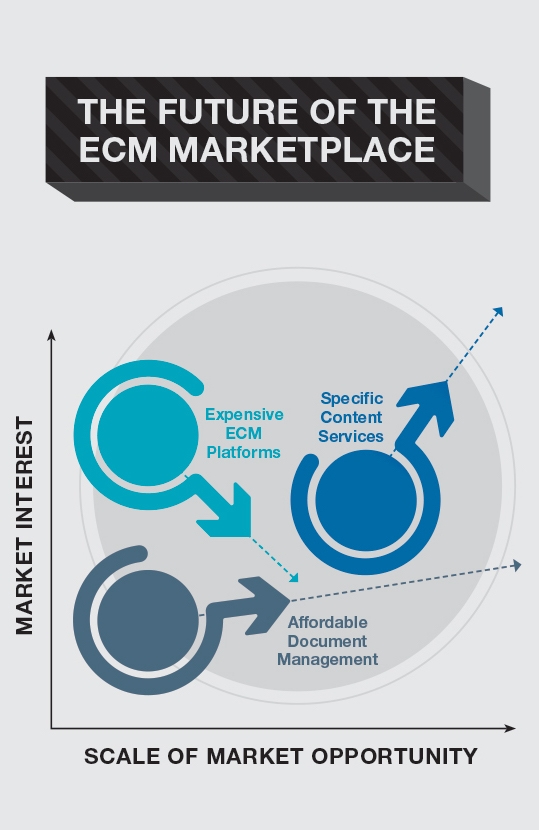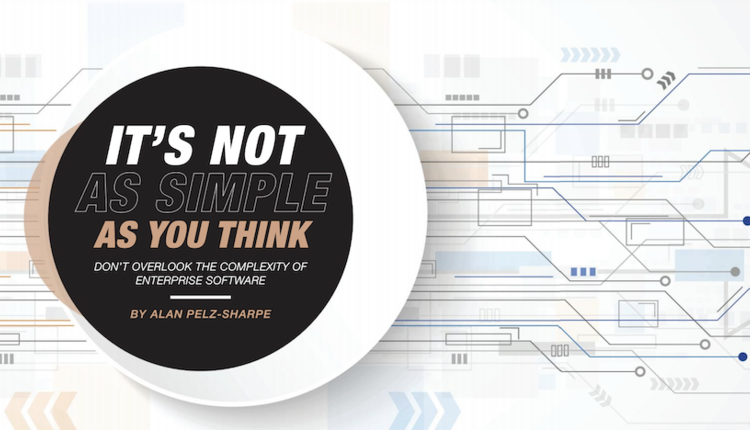This article appears in the Fall 2018 magazine issue of DOCUMENT Strategy. Subscribe.

The fact is that documents need to be captured and processed more today than ever before—products need to be developed, sold, and implemented to do that work. While the ECM marketplace is going through an identity crisis, marked by some big changes, it remains a vibrant and fast-growing segment.
To make any sense of the ECM marketplace, it’s important to understand that there are two distinct elements to this market and, as you will see later on, arguably even three. For just as in retail, we have Harrods and Nordstrom at the high end, with Dollar General and the Poundshop at the other. Both have their place, and both turn over a lot of revenue.

©2018 DOCUMENT Strategy
These days, all the talk is about how enterprise content management (ECM) is (to quote Gartner) “dead, kaput, finite, an ex-market name.” In some circles, the industry’s lexicon has moved on to a new term: content services. So, the question is, “Is there an ECM marketplace still?”
In truth, it shouldn’t take long to come up with the right answer: “Of course, there is an ECM marketplace.” We might use different terms, but other than marketers, who really cares?
The fact is that documents need to be captured and processed more today than ever before—products need to be developed, sold, and implemented to do that work. While the ECM marketplace is going through an identity crisis, marked by some big changes, it remains a vibrant and fast-growing segment.
To make any sense of the ECM marketplace, it’s important to understand that there are two distinct elements to this market and, as you will see later on, arguably even three. For just as in retail, we have Harrods and Nordstrom at the high end, with Dollar General and the Poundshop at the other. Both have their place, and both turn over a lot of revenue.
Similarly, in the ECM marketplace, there is still a need for complex platforms that handle millions, if not billions, of files. Platforms that are sophisticated and leverage complex process management capabilities are the high end of the market. At the same time, it's a niche segment and few can afford it. At the other end, we have hundreds of specialist document management vendors that provide lower-priced, but no less essential, systems to manage things like accounts payable and receivable or industry-specific activities in sectors such as oil and gas, healthcare, and legal.
Instead, many have begun to take a do-it-yourself (DIY) approach, building their own systems in the cloud. Most are turning to Amazon Web Services (AWS) and leveraging their cloud services, such as Amazon Elastic File System, Amazon Machine Learning, and Amazon’s data archiving service Glacier. Some are developing major ECM systems on Box, while others are opting for Microsoft Azure’s cloud computing services. Yet others see no need for a separate ECM system, since those functionalities are already bundled into their Oracle or SAP software as a service (SaaS) licenses.
Whether it's a good idea or not to go it alone is a discussion for another day, but, nonetheless, these trends will grow substantially over the coming years.
 Traditional document management and workflow systems continue to thrive in the mid-market and at the departmental level in larger organizations. They are simple to deploy, pre-configured, and can give a quick return on investment. Vendors like Laserfiche, KnowledgeLake, Square 9, and ICAN remain busy in this particular market.
Traditional document management and workflow systems continue to thrive in the mid-market and at the departmental level in larger organizations. They are simple to deploy, pre-configured, and can give a quick return on investment. Vendors like Laserfiche, KnowledgeLake, Square 9, and ICAN remain busy in this particular market.
As a firm grows to more than 200 employees, so does the need to move away from the manual processing of back-office activities, such as accounts, human resources, or compliance. As a result, there is no shortage of customers here, but there are also many suppliers all vying for much-needed market visibility.
There are still hundreds of service bureaus to scan and digitize paper documents, and there’s not much of a slowdown here, as the paperless office continues to be a distant dream. While the work that these vendors do in this market may be perceived as traditional, there is a constant demand for it, and it brings real and measurable value.
Then, there are the firms that want to leverage newer technologies, like artificial intelligence (AI) and blockchain, but don’t want to rip and replace the solutions already in place. This is ushering in a new generation of startups, including the likes of Moonoia, Haystac, P3iD, and Sphereon, to provide those replacements and upgrades.
The High End of the Market
When we think about ECM, what usually comes to mind first are the big implementations of Documentum, IBM FileNet, and OpenText in Fortune 1000 firms around the world. These are the systems that manage hundreds of millions and even billions of files, but today, there is a shrinking group of buyers with the appetite for such massive implementations of a broad ECM platform.Instead, many have begun to take a do-it-yourself (DIY) approach, building their own systems in the cloud. Most are turning to Amazon Web Services (AWS) and leveraging their cloud services, such as Amazon Elastic File System, Amazon Machine Learning, and Amazon’s data archiving service Glacier. Some are developing major ECM systems on Box, while others are opting for Microsoft Azure’s cloud computing services. Yet others see no need for a separate ECM system, since those functionalities are already bundled into their Oracle or SAP software as a service (SaaS) licenses.
Whether it's a good idea or not to go it alone is a discussion for another day, but, nonetheless, these trends will grow substantially over the coming years.
The Lower End of the Market

©2018 Deep Analysis LLC
As a firm grows to more than 200 employees, so does the need to move away from the manual processing of back-office activities, such as accounts, human resources, or compliance. As a result, there is no shortage of customers here, but there are also many suppliers all vying for much-needed market visibility.
There are still hundreds of service bureaus to scan and digitize paper documents, and there’s not much of a slowdown here, as the paperless office continues to be a distant dream. While the work that these vendors do in this market may be perceived as traditional, there is a constant demand for it, and it brings real and measurable value.
An Emerging Third Marketplace
Finally, here is where it gets interesting with the emergence of a third market: content services. While the term may have come into popular parlance over the past year, best-of-breed plug-and-play products (or services) have been around for decades. It’s true that most large organizations already have adequate file management and storage capabilities. However, what has changed is that the sheer volumes of files to process only continue to grow, and first-generation search, compliance, automation, and analysis functions are in dire need of replacement.Then, there are the firms that want to leverage newer technologies, like artificial intelligence (AI) and blockchain, but don’t want to rip and replace the solutions already in place. This is ushering in a new generation of startups, including the likes of Moonoia, Haystac, P3iD, and Sphereon, to provide those replacements and upgrades.
Larger firms, such as OpenText, Kofax, and Hyland, have many content services of their own, but right now, the very idea of allowing rival ECM products to utilize them remains a significant roadblock.
The interest in content services, particularly for AI, machine learning, compliance, and blockchain, is real, and so, there are huge market opportunities here.
Those vendors willing to adopt and adapt will thrive, while others, who want to return to the good old days, will die on the vine.
The Future of ECM
The bottom line is that as long as we process documents—be they paper or electronic—there will be a marketplace for ECM (or whatever else we want to call it). The monikers and products may change, but the need for them will not only remain but indeed flourish.Those vendors willing to adopt and adapt will thrive, while others, who want to return to the good old days, will die on the vine.
At Deep Analysis, we see a huge opportunity for the market, with continued consolidation in the mid- to low-end and disruption and transformation at the high end. We think that’s a good thing all around, so embrace the change, and thrive.
Alan Pelz-Sharpe is the Founder and Principal Analyst of Deep Analysis, an independent technology research firm focused on next-generation information management. He has over 25 years of experience in the information technology (IT) industry working with a wide variety of end user organizations and vendors. Follow him on Twitter @alan_pelzsharpe.






![GettyImages-1211616422-[Converted]](https://cms-static.wehaacdn.com/documentmedia-com/images/GettyImages-1211616422--Converted-.2413.widea.0.jpg)






